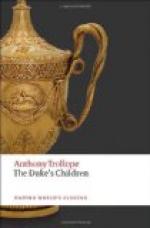But he had other points in his favour besides the friendship of Lord Silverbridge,—points which had probably led to that friendship. He was, without doubt, one of the best horsemen in England. There were some who said that, across country, he was the very best, and that, as a judge of hunters few excelled him. Of late years he had crept into credit as a betting-man. No one supposed that he had much capital to work with, but still, when he lost a bet he paid it.
Soon after his return from Spain, he was chosen as Master of the Runnymede Fox Hounds, and was thus enabled to write the letters M.F.H. after his name. The gentlemen who rode in the Runnymede were not very liberal in their terms, and had lately been compelled to change their Master rather more frequently than was good for that quasi-suburban hunt; but now they had fitted themselves well. How he was to hunt the county five days a fortnight, finding servants and horses, and feeding the hounds, for eight hundred pounds a year, no one could understand. But Major Tifto not only undertook to do it, but did it. And he actually succeeded in obtaining for the Runnymede a degree of popularity which for many years previous it had not possessed. Such a man,—even though no one did know anything of his father or mother, though no one had ever heard him speak of a brother or a sister, though it was believed that he had no real income,—was felt by many to be the very man for the Beargarden; and when his name was brought up at the committee, Lord Silverbridge was able to say so much in his favour that only two blackballs were given against him. Under the mild rule of the club, three would have been necessary to exclude him; and therefore Major Tifto was now as good a member as anyone else.
He was a well-made little man, good-looking for those who like such good looks. He was light-haired and blue-eyed, with regular and yet not inexpressive features. But his eyes were small and never tranquil, and rarely capable of looking at the person who was speaking to him. He had small, well-trimmed, glossy whiskers, with the best-kept mustache, and the best-kept tuft on his chin which were to be seen anywhere. His face still bore the freshness of youth, which was a marvel to many, who declared that, from facts within their knowledge, Tifto must be far on the wrong side of forty. At a first glance you would hardly have called him thirty. No doubt, when, on close inspection, you came to look into his eyes, you could see the hand of time. Even if you believed the common assertion that he painted,—which it was very hard to believe of a man who passed the most of his time in the hunting-field or on a race-course,—yet the paint on his cheeks would not enable him to move with the elasticity which seemed to belong to all his limbs. He rode flat races and steeple chases,—if jump races may still be so called; and with his own hounds and with the Queen’s did incredible things on horseback. He could jump over chairs too,—the backs of four chairs in a dining-room after dinner,—a feat which no gentleman of forty-five could perform, even though he painted himself ever so.




